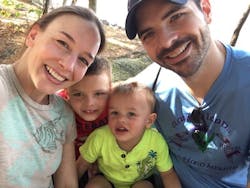Putman Media’s Influential Women in Manufacturing program launched this year. We received nearly 100 nominations for women with varying titles across many industries. As part of the coverage, Chemical Processing is profiling winners in the chemical industry to learn more about their trials and triumphs. First up is Rachelle Howard, senior process control engineer, Vertex Pharmaceuticals, and Chemical Processing’s newest editorial board member.
What got you interested in chemical engineering as a career path?
I had never heard of engineering until my junior year of high school. A teacher brought a few girls to a Women in Engineering Conference. That's when I actually learned what engineering was and realized it was a little bit more about solving problems and finding workable solutions — that part of it really resonated with me. I'd already applied to a lot of colleges for chemistry degrees. After going to that conference, I shifted gears from chemistry to chemical engineering and that's when I decided that was the path for me.
Rachelle Howard, a 2018 Influential Women in Manufacturing winner, and her husband Mark love spending time outdoors with their sons Drew (left) and Wesley.
What are some of the challenges you face in your field?
I'm really fortunate to be at the company I'm with now. I don't feel like there's any gender bias. We have very open discussions and it doesn't matter what level you are. People are open and willing to listen. I think [I witness gender bias] more from previous companies or when I go to conferences or try joining different forum groups. Automation, like a lot of engineering, is predominantly composed of older men and, sometimes, the willingness to listen or take me in as also being an expert in this area is not really as open. That's more where I feel the challenges are. I have to prove myself a lot more before I get the crowd to start to listen. At my old job, I had to go through the task of having the same thing said by a couple of guys and then it was like, "Oh, okay. Yeah. Well, now I believe you." It was a little frustrating.
What has been your biggest triumph thus far?
I'm actually very proud of the current project that we've been working on, which is redesigning the control system that operates our manufacturing system. I've been leading that and we finally got into the initial deployment late last year. Things are going fairly smoothly and it's up and running. It's just very rewarding seeing this all come together.
Regarding automation, where do you see things in the next five years? Ten years?
A lot of what we do in automation is not very cutting edge. It's relying on older, trusted technologies. Things that we know have been proven to operate well and can get fast response times and fail-safes are designed to operate in milliseconds and that's needed for some equipment. But things in the world are just so much more automated now. There's so much more proof that new technologies can roll out quicker and there's much more advanced programming languages, data retrieval tools and accessibility which can advance manufacturing. Manufacturing still has long ways to go to catch up and it probably doesn't need to lag behind like it has in the past.
I think a lot of younger engineers who grew up with computers have an advantage. I don't think of myself as very old but I didn't have a computer in our house until almost junior high. It’s not something I can say I really grew up with. But the younger crowd does have that and they bring in a lot of skills and technologies. There's no reason automation needs to stay several steps behind. I think it's going to start to catch up with more modern tools that are available. Why try to program advanced modeling into ladder logic when you could put it into MATLAB or similar program and integrate that into your system?
What changes do you wish you could impress upon the pharmaceutical industry?
I've always had an interest in how we can get at the data and get at it in a more automated way. Not only to just improve the process in some areas but to have that automated view and triggers to be able to say where can we improve the process. What's going wrong? What's different than it used to be? So a lot of what I bring and what I continue to drive and look for are ways to work smarter. There's certainly been a big push throughout all of manufacturing, not just pharma, to look at the data and how we can get more out of it, and not just have these data graveyards. I expect I can make some differences in this area and help to move things forward.
Why do you think that you can make those changes?
I work closely with a lot of our process engineers. I don't expect that I'm going to be the one who's going to dig in, analyze and find every nook and cranny of the data and find what's going to help us identify changes in the trends of our process. But I'm good at listening, understanding and integrating solutions for other peoples' needs. And so looking at our current control system and bringing in a new data historian, I am able to see things — for example, recognizing that the way that we track materials that move through our process doesn't align with that historian and that people are going to want to be able to have the tools on top of that and be able to go out and find those tools, and even work with those vendors to build on additional functions into those tools. I think what I bring to the table is being able to understand the user's needs and turn that into an actual function, an actual solution to get people what they are looking for.
Self-proclaimed DIYer Rachelle Howard, a senior process control engineer at Vertex Pharmaceuticals, enjoys decorating cakes.
Do you have advice for young women thinking about becoming chemical engineers?
I think even beyond just becoming chemical engineers but in general, listening and learning is incredibly important to know what you're talking about. Then when you feel like you know what you're talking about, don't be afraid to speak your mind. I think for me a big turning point was that I often felt like, "Oh, everyone else in the room already knows what I'm thinking and there's no reason I need to speak up." But I gradually realized that that wasn't necessarily true and the more that I could speak up and share my unique ideas and ways to solve problems, I found that I really had a voice and something to add. I wish I'd figured that out sooner and gained that confidence to be able to speak up even earlier in my career. It's something that I'd like to impress upon younger women — try not to be intimidated by the crowd and participate as much as you can and share your ideas and help the team move forward.
Tell me something that not many people know about you.
I try a lot of DIY stuff. Some successful and some not but I've found that I really like to bake and decorate cakes. I get really into that, especially for my kids' birthdays. And I like to build things — even if it's just IKEA furniture, I just like to get hands-on and put things together or just try to fix things around the house. I guess it's an engineer sort of thing to do.
What question should I be asking that I haven’t?
For me, the question is always “How do you balance home and work life?” But asking that is more me curious what other peoples' answers might be because it is something that's always a challenge. You know, sometimes I feel like I'm winning and other times I'm just definitely not. It is a struggle. Finding a company that had a lot of flexibility has helped a ton. I feel like I have more of those winning moments that I can be there for the kids.
But I do want to focus on my career, so there are a lot of late nights and there are times when I need to travel a lot and I can't be as involved or as awake or as energetic as I want to be. So it's a balance. Something I'm still learning and working through and sometimes it's easier as the kids get older, but there're going to be harder moments, too, as they have more sports and things that I don't want to miss. People have so many different strategies so I’m always curious to hear what works for others that might help me too.
Quick Hits
Favorite band: I honestly don't have a favorite band. Usually I listen to all the Top 40s pop hits.
Favorite movie: “Princess Bride."
If you weren’t a chemical engineer you’d be: I'd say a teacher. My parents were teachers and that's even why I got a Ph.D. I had thought, "Well, I want to go and work in the industry but maybe someday I want to go back and teach, as well."
You don't want to be a professional baker?
Not quite sure I'm at that level but who knows. It's fun.





